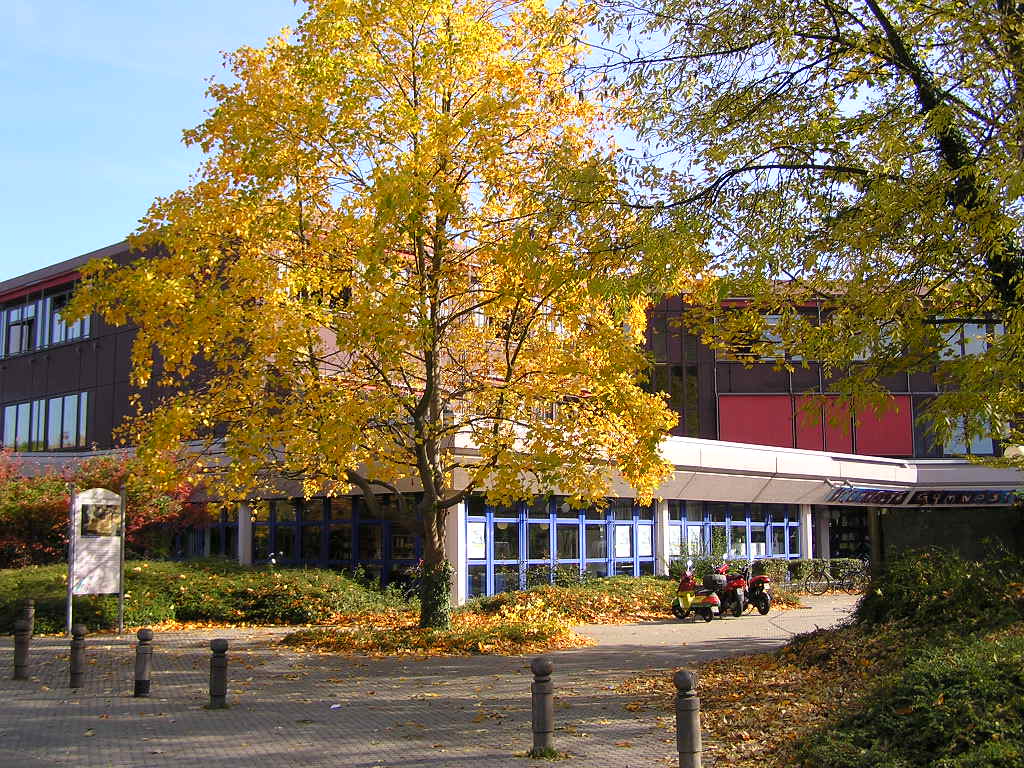|
Bibliotheca Bipontina
The Bibliotheca Bipontina is a regional scientific library in Zweibrücken, which has been part of the since 1 September 2004. It is one of the most important libraries in the land. The book stock amounts to about 120,600 volumes , including 12,000 volumes of the museum's old stock from the princely libraries of the dukes of Zweibrück. It also holds the libraries of the Association for Palatine Church History (about 20,000 volumes) and the Zweibrücken Historical Association (about 10,000 volumes). The main focus of the holdings is on regional literature of the Palatinate and on humanities subjects. The founding collection of the Bibliotheca Bipontina was included in the ''Länderverzeichnis national wertvollen Kulturgutes'' in 2015. History While the libraries in Zweibrücken were almost completely destroyed by the war events of the 17th century, the library in Bischwiller of the Birkenfeld line remained, which was brought to the Zweibrücken residence in the 18th centur ... [...More Info...] [...Related Items...] OR: [Wikipedia] [Google] [Baidu] |
Zweibrücken
Zweibrücken (; ; , ; literally translated as "Two Bridges") is a town in Rhineland-Palatinate, Germany, on the Schwarzbach (Blies), Schwarzbach River. Name The name ''Zweibrücken'' means 'two bridges'; older forms of the name include Middle High German ''Zweinbrücken'', Latin ''Geminus Pons'' and ''Bipontum'', and French language, French ''Deux-Ponts'', all with the same meaning. History The town was the capital of the former Imperial State of Palatine Zweibrücken owned by the House of Wittelsbach. The ducal castle is now occupied by the high court of the Palatinate (''Oberlandesgericht''). There is a fine Gothic architecture, Gothic Protestant church, Alexander's church, founded in 1493 and rebuilt in 1955. From the end of the 12th century, Zweibrücken was the seat of the County of Zweibrücken, the counts being descended from Henry I, youngest son of Simon I, Count of Saarbrücken (d. 1182). The line became extinct on the death of Count Eberhard II (1394), who in 13 ... [...More Info...] [...Related Items...] OR: [Wikipedia] [Google] [Baidu] |
Palatinate (region)
The Palatinate (; ; Palatine German language, Palatine German: ''Palz''), or the Rhenish Palatinate (''Rheinpfalz''), is a historical region of Germany. The Palatinate occupies most of the Southern Germany, southern quarter of the German States of Germany, federal state of Rhineland-Palatinate (''Rheinland-Pfalz''), covering an area of with about 1.4 million inhabitants. Its residents are known as Palatines (''Pfälzer''). Geography The Palatinate borders Saarland in the west, historically also comprising the state's Saarpfalz-Kreis, Saarpfalz District. In the northwest, the Hunsrück mountain range forms the border with the Rhineland region. The eastern border with Hesse and the Baden-Württemberg, Baden region runs along the Upper Rhine river, while the left bank, with Mainz and Worms, Germany, Worms as well as the Selz basin around Alzey, belong to the Rhenish Hesse region. In the south, the German-France, French border separates the Palatinate from Alsace. One-thir ... [...More Info...] [...Related Items...] OR: [Wikipedia] [Google] [Baidu] |
Humanities
Humanities are academic disciplines that study aspects of human society and culture, including Philosophy, certain fundamental questions asked by humans. During the Renaissance, the term "humanities" referred to the study of classical literature and language, as opposed to the study of religion, or "divinity". The study of the humanities was a key part of the secular curriculum in universities at the time. Today, the humanities are more frequently defined as any fields of study outside of natural sciences, social sciences, formal sciences (like mathematics), and applied sciences (or Professional development, professional training). They use methods that are primarily Critical theory, critical, speculative, or interpretative and have a significant historical element—as distinguished from the mainly Empirical method, empirical approaches of science."Humanity" 2.b, ''Oxford English Dictionary'', 3rd ed. (2003). The humanities include the academic study of philosophy, religion, histo ... [...More Info...] [...Related Items...] OR: [Wikipedia] [Google] [Baidu] |
Bischwiller
Bischwiller (; ; ) is a commune in the Bas-Rhin department in Grand Est in northeastern France, just west of the river Moder. Geography The city is southeast of Haguenau, west-northwest of the German border and the Rhine (Rhin), and lies north-northeast of Strasbourg. The Moder, a Rhine tributary, flows across the town. Among the other streams which cross the area can be cited the following tributaries of the Moder: the Rothbaechel, the Erlengraben and the Waschgraben. The last one is formed by the confluence of two smaller streams named ''Weihergraben'' and ''Schnuchgraben''. Population Due to its large Turkish minority, Bischwiller has been pejoratively dubbed "Turcwiller" or "Bischtanbul". Culture * Maison des Arts (Bischwiller) * Musée de la Laub Personalities * Henri Baumer, master carpenter * Claude Vigée, poet * Jacob Kirkman and Abraham Kirkman, harpsichord makers * Jean Daum, glassware manufacturer * Lucien Muller, footballer * Otto Meißner, Germ ... [...More Info...] [...Related Items...] OR: [Wikipedia] [Google] [Baidu] |
Principality Of Birkenfeld
The Principality of Birkenfeld (), known after 1919 as the Region of Birkenfeld (), was an exclave of the Grand Duchy and then the Free State of Oldenburg from 1817 until 1937, when it was incorporated into Prussia. It was located in the Nahe region on the left bank of the Rhine river and its capital was Birkenfeld. The government was led by a Government-President (''Regierungspräsident'') who was appointed by the government of Oldenburg. Territory The area of the Principality of Birkenfeld was composed from the territory that had previously belonged to the Sarre department of the First French Empire. The French had annexed the territory from seven different sovereigns: * Baden: Most of the court district of Birkenfeld and the southern half of the court district of Oberstein; * Palatine Zweibrücken: Mayoralties of Nohfelden and Achtelsbach, small parts of Birkenfeld and Neunkirchen; * County of Limburg-Stirum: Most of the Mayoralty of Oberstein; * of Salm: Part of the cou ... [...More Info...] [...Related Items...] OR: [Wikipedia] [Google] [Baidu] |
Charles I, Count Palatine Of Zweibrücken-Birkenfeld
Charles I of Zweibrücken-Birkenfeld (4 September 1560 – 16 December 1600), Count Palatine of the Rhine, Duke in Bavaria, Count to Veldenz and Sponheim was the Duke of Zweibrücken-Birkenfeld from 1569 until 1600. Life Charles was born in Neuburg in 1560 as the youngest son of Wolfgang, Count Palatine of Zweibrücken. After his father's death in 1569, Charles and his brothers partitioned his territories: Charles received the Palatine share on the Rear County of Sponheim, a small territory around Birkenfeld. Charles is the founder of the House of Palatinate-Birkenfeld. Charles died in Birkenfeld in 1600 and was buried in Meisenheim. Charles was a prince of a relatively unimportant state, and his chief fame is that the Kings of Bavaria descended from him. Marriage Charles married Dorothea of Brunswick-Lüneburg (1 January 1570 – 15 August 1649), daughter of Duke William VI, on 23 February 1590 and had the following children: # George William (6 August 1591 – 25 December ... [...More Info...] [...Related Items...] OR: [Wikipedia] [Google] [Baidu] |
Wolfgang, Count Palatine Of Zweibrücken
Count Palatine Wolfgang of Zweibrücken (; 26 September 1526 – 11 June 1569) was member of the Wittelsbach family of the Counts Palatine and Duke of Zweibrücken from 1532. With the support of his regent, his uncle Rupert (later made the Count of Veldenz), Wolfgang introduced the Reformation to Zweibrücken in 1537. Biography He was the only son of Louis II, Count Palatine of Zweibrücken and his wife Elisabeth of Hesse, daughter of William I, Landgrave of Hesse. His father died in 1532, so the regency of Palatinate-Zweibrücken passed to Louis' younger brother Rupert until 1543. In 1557 Wolfgang received the territory of Palatinate-Neuburg in accordance with the Contract of Heidelberg. In 1548 the Holy Roman Emperor Charles V occupied his Protestant territories and reintroduced Catholic practices. Wolfgang regained his territories in 1552. Despite the Peace of Augsburg of 1555 several ecclesiastical states in Germany were secularised in 1557, a few of which Wolfgan ... [...More Info...] [...Related Items...] OR: [Wikipedia] [Google] [Baidu] |
Bipont Editions
Bipont Editions (also known as the Bipontine Editions), the name of a famous series of editions, in 50 volumes, of Greek and Latin classical authors, so called from Bipontium, the modern Latin name of Zweibrücken (also referred to as "Deux Ponts"; English, "two bridges") in the Rhineland-Palatinate where they were first issued by the Societas Bipontina (under the supervision of Friedrich Christian Exter and Georg Christian Crollius) in 1779. Their place of publication was afterwards transferred to Strasbourg Strasbourg ( , ; ; ) is the Prefectures in France, prefecture and largest city of the Grand Est Regions of France, region of Geography of France, eastern France, in the historic region of Alsace. It is the prefecture of the Bas-Rhin Departmen ... (referred to on the title pages by the Latin name of "Argentoratum"). References Further reading * Friedrich Butters, Ueber die Bipontiner und die Editiones Bipontinae'. Zweibrücken 1877. * Georg Burkard: ''Bibliographie de ... [...More Info...] [...Related Items...] OR: [Wikipedia] [Google] [Baidu] |
Georg Christian Crollius
Georg Christian Crollius (21 July 1728 – 23 March 1790) was a German historian and librarian. He was born in Zweibrücken, the son of the gymnasial headmaster Johann Philipp Crollius and Margaretha Gabriela Joannis. Crollius studied in Halle and Göttingen. He succeeded his father in the management of the Herzog-Wolfgang-Gymnasium in Zweibrücken, the most renowned school in Palatinate-Zweibrücken. Duke Christian IV appointed him also to the committee of the library, the present-day Bibliotheca Bipontina, and to court historiographer. Similar to his father he researched the history of Palatinate-Zweibrücken and of the Rhenish County Palatine. As a member of the Mannheim academy (since 1765) he wrote several essays, which were printed in the series of the academy. The ''Origines Bipontinae'' (1761–1769) might be cited as his main work. Starting in 1779 he contributed also to the ''Editiones Bipontinae''. He died in his home town of Zweibrücken Zweibrücken (; ; , ; ... [...More Info...] [...Related Items...] OR: [Wikipedia] [Google] [Baidu] |
Die Rheinpfalz
''Die Rheinpfalz'' () is a German–language regional newspaper based in Ludwigshafen, Germany. The paper is one of the leading newspapers which serve the state of Rhineland-Palatinate. History and profile ''Die Rheinpfalz'' was first published in September 1945. The co-founders of the paper were Arthur Lenk, Hans Wipprecht and Xaver Resch. The Allied Forces that occupied Germany following World War II supported the establishment of the paper of which the parent company is the Medien Union GmbH. The paper is owned by Stuttgarter Zeitung Verlagsgesellschaft GmbH which also owns '' Freie Presse'', '' Südwestpresse'' and ''Stuttgarter Zeitung The () is a German language, German-language daily newspaper (except Sundays) edited in Stuttgart, Baden-Württemberg, Germany, with a run of about 200,000 sold copies daily. History and profile It was first edited on 18 September 1945, just ...'', among others. ''Die Rheinpfalz'' is published by a company with the same name, Die Rhe ... [...More Info...] [...Related Items...] OR: [Wikipedia] [Google] [Baidu] |
Libraries In Germany
A library is a collection of books, and possibly other materials and media, that is accessible for use by its members and members of allied institutions. Libraries provide physical (hard copies) or digital (soft copies) materials, and may be a physical location, a virtual space, or both. A library's collection normally includes printed materials which may be borrowed, and usually also includes a reference section of publications which may only be utilized inside the premises. Resources such as commercial releases of films, television programmes, other video recordings, radio, music and audio recordings may be available in many formats. These include DVDs, Blu-rays, CDs, cassettes, or other applicable formats such as microform. They may also provide access to information, music or other content held on bibliographic databases. In addition, some libraries offer creation stations for makers which offer access to a 3D printing station with a 3D scanner. Libraries can vary widely ... [...More Info...] [...Related Items...] OR: [Wikipedia] [Google] [Baidu] |





